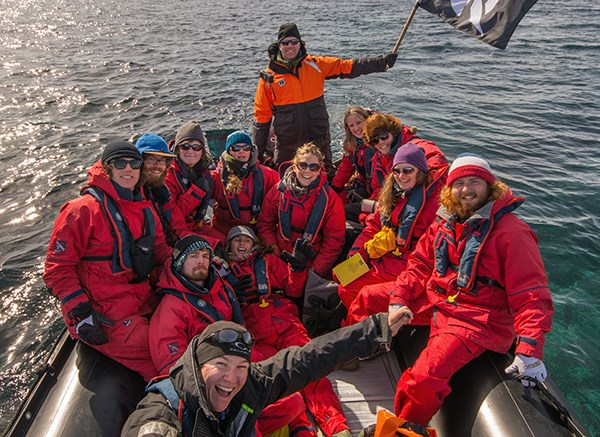A dozen Quest University students are now heading south for a very long field trip.
In fact, they’re heading about as far south as you can go.
“It’s a strange place. It’s an entire continent on our planet that no one had ever seen,” Quest’s Colin Bates told The Squamish Chief in advance of the trip.
For the second time, the university is making a trip to Antarctica, partnering with local operator One Ocean Expeditions.
“We’re been involved with universities for the last decade,” said One Ocean’s general manager, Cathy Lawton.
The Quest trip began on Jan. 9 and will include sites around the southernmost continent following a stop in the Falkland Islands.
The time frame fits well within Quest’s block system, in which students take one class exclusively for three and a half weeks before moving to the next course. It’s is the right time of the year, as January marks the middle of the warm months in the south – or as warm as it gets, anyway.
“It’s aligned very well with the ideas that we work with a Quest,” said Bates, who teaches life sciences at Quest.
“There’s nothing quite like being there.”
Bates has worked with One Ocean before and has been to the Antarctic a few times, including the previous trip with Quest students.
The group will be making stops at sites such as Sea Lion Island, Elephant Island, South Shetland Islands, the Antarctic Peninsula and King George Island, which is where most of the scientific research takes place on the continent.
For Bates, Antarctica offers a wealth of education opportunities, from the scientific to the historical to the geopolitical – everything from the exploits of explorer Ernest Shackleton and issues at stake concerning international treaties that govern the region to threats against current bans on mineral development.
The students will also have opportunities to examine biology and questions about whaling, as well as to delve into issues such as climate change in an area under heavy scrutiny.
“We’ll be wrestling with a bunch of questions while we’re down there,” said Bates.
The Quest group will also meet scientists working on board the ship.
“It’s a very rich classroom in the wild,” Bates said.
The students are blogging about the trip, which can be found online at tantalus.questu.ca/cbates.
The trip will also provide students the opportunity to travel on the Akademik Sergey Vavilov, one of the ships used to search for a vessel lost in the doomed Franklin expedition while in search of the Northwest Passage. “We call it the One Ocean Voyager,” Lawton said.
One Ocean will continue trips south for the next couple of months as marine mammals arrive in the area. “We’re pushing it because of the marine mammal activity,” said the general manager.
The expedition company also operates trips to the Arctic.




